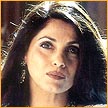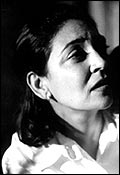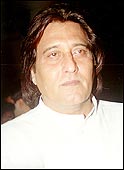
|
A dysfunctional universe
Somnath Sen's Leela probes human relationships passionately
|
Subhash K Jha
In one of the many mellifluous and mellow moments of Leela, a subtle, erotic drama about cross-cultural conflicts, Dimple Kapadia (as a grieving visiting professor to the US) tells her young student a story about the burdens that we carry in life.
Two monks were travelling together when one helped a girl to her destination, carrying her on his shoulders. This did not go down well with the other monk. He promptly reported the breach of abstinence from female contact to his senior.
'He carried the girl to her destination? Then why are you still carrying her on your shoulder?' the senior monk asked.
Leela exemplifies that breaking away from seemingly sacrosanct rules of moral conduct which have been guiding our cinema and their protagonists over generations of self-denial. As Leela Delhvi, a teacher trying to come to terms with her mother's death and marriage to a suave, magnetic womaniser by escaping to New York, Dimple transgresses a major boundary set for leading ladies in our cinema.
Of course, Leela is not 'our' cinema. If debutant director Somnath Sen had made his first film in his native country, he would most certainly have not shown the protagonist going all the way with her student.
Leela is not a film about half-measures. It addresses itself to the question of profound yearnings in a language that is at once fresh, exciting, erotic and creatively alive. The songs written by Gulzar and composed by Jagjit Singh may not mesh into the narrative as fluently as they did in, say, Farhan Akhtar's Dil Chahta Hai, another film where Dimple's character had a relationship with a much younger man.
Leela is a film that flaunts its jagged edges with some pride and considerable passion. The songs or, for that matter, some of the scenes that crowd around the main collage of emotions emerging from Dimple's character, may not 'belong' completely in the narrative.
The disoriented episodes fit in well with the theme of disorientation. Where we expect high drama and thunderous tension, Sen constantly opts for understatement and an almost dismissive regard for the conventions of storytelling.
 Often, we feel the scenes do not go far enough in search of those answers which the women in the screenplay set out to unravel. But the questions per se are deeply illuminating. More than the central relationship between the visiting professor and the virginal student, it is the strong bond that grows between the boy's mother Chaitali and Leela that we cherish.
Often, we feel the scenes do not go far enough in search of those answers which the women in the screenplay set out to unravel. But the questions per se are deeply illuminating. More than the central relationship between the visiting professor and the virginal student, it is the strong bond that grows between the boy's mother Chaitali and Leela that we cherish.
The scenes are shot in real light, yet emerge in a surreally lit enclave where truth is as nebulous as the lies that we weave around ourselves.
Dimple has always excelled in playing frazzled, existentially confounded beauties. Much to our surprise, in Leela, she seems slightly distracted. We are not sure whether Dimple is 'in character' or just thinking about the candles that she could have been making instead.
Deepti Naval as the single mother Chaitali is far more vivacious and into her part. For long typecast in Mumbai as a moping matriarch, she gets into her glamorous togs with relish.
Deepti's part has more shades than Dimples. A single mother to a culturally ambivalent 18-year old Indian boy in the US, she hides her lover from her son's eyes and scolds him for using swear words as stubbornly as she flaunts her Indian values.
Leela portrays a blissfully dysfunctional universe of characters seeking unity in its distending diversity. Sen gives his exiled characters a lot of rope to hang their hopes as they pursue their dreams (American or otherwise), in a land of a zillion contradictions. Sen's young protagonist Krishna (debutant Amol Mhatre who acts with a confidence that belies his inexperience) reaches out a hand to steady his adolescent waverings and stumbles on a truth much larger than he can handle.
 The 'seduction' scene is done with a certain alienating restraint, as though the director wanted to search the liberating alchemy that underlines the unconventionality of a sexual relationship between two such dissimilar human beings. Leela's ensuing guilt and embarrassment, compounded by Krishna's mother's naked contempt for Leela's transgression, is illuminated with honesty until Leela's poet-husband Naushad arrives in the US.
The 'seduction' scene is done with a certain alienating restraint, as though the director wanted to search the liberating alchemy that underlines the unconventionality of a sexual relationship between two such dissimilar human beings. Leela's ensuing guilt and embarrassment, compounded by Krishna's mother's naked contempt for Leela's transgression, is illuminated with honesty until Leela's poet-husband Naushad arrives in the US.
The way Vinod Khanna plays the character Naushad appears more pompous than hypnotic. An aura of tired decadence surrounds Khanna. We cannot think of poetry when we are confronted by a sight so prosaic. The role required the charm and depth of Gulzar.
The rest of the cast fits into the scheme of Diaspora with effortless calm. Mhatre, as the teenager coming of age, maps out his character's defiance and confusion with immense empathy and conviction. While Dimple Kapadia, Deepti Naval and Gulshan Grover playing his teacher, mother and father provide captivating complementary collages, Vinod Khanna just does not get into the grooves of his part.
The photography by Steven Douglas Smith is rich in shades of sighs and whispers suppressing and secreting sobs of disenchantment. But the editing (by Suresh Pai) is too much in a hurry to get on with the show. The unhurried inner lives of the characters clash bitterly with the breakneck editing pattern.
Leela does not have answers at its fingertips. Its passionate probings create an intriguing spectre of disembodied emotions catching two mismatched disoriented souls --- one from India and the other in the US --- in tightly expressive closeups.
The film is slated for an Indian release in November.
Earlier Features:
Writer-director Somnath Sen on Leela
Dimple Kapadia on Leela
'Leela is a Hollywood production with the soul of a Hindi film'
On the sets of Leela
India had changed, their parents hadn't